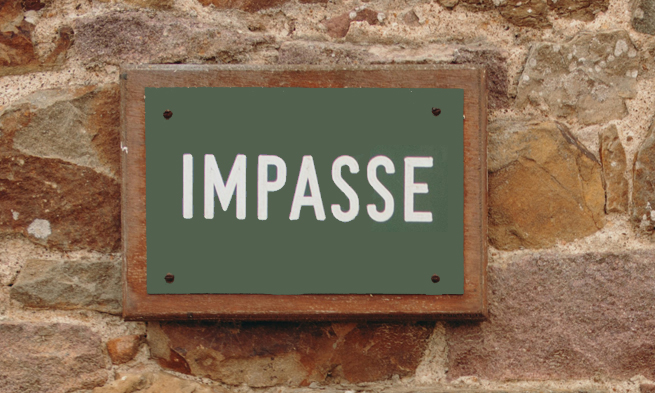It is not uncommon in mediation, even those that settle, to face the very real prospect of impasse. In money negotiations in particular, the negotiation becomes narrowly focused on that one question: how much? Although there is no secret formula that can overcome this prospect, there are a number of ways a mediator can lead the parties past it.
In this commentary I do not suggest that all of these suggestions are appropriate in every mediation or that in all cases one or more of them is likely to be successful. Every negotiation, like most civil cases, is unique. Beyond the facts and the law, the negotiators are unique as are the parties’ underlying interests. There is simply no way to suggest universal solutions that are equally valuable in an estate dispute between dependents and a multi-party construction defect dispute. Nevertheless, here are some ideas.
Explore Interests to Find Win-Win Solutions
In Getting to Yes, Fisher & Ury make the distinction between positions and interests. According to the classic, positions are what we demand or offer. Interests are the underlying motivations for those positions. Exploration of those interests may lead to a way to satisfy both sides. The difference is explained here.
Most civil case mediations are resolved by the exchange of a monetary settlement. On occasion, I am asked why mediation doesn’t just get to the point — that is an exchange of offers and counter-offers that incrementally narrow the gap. My answer, which is not intended to be flippant, is that if the case could settle by the simple exchange of money offers, why hasn’t it settled without mediation.
Although exploration of underlying motivations probably have less value in a money negotiation than in mediations involving the dissolution of a business or an argument over elder care or a will, I believe there is value in exploring the why. Why are the parties taking the positions they are taking? A cautionary note though from Chris Voss in “Never Split the Difference” is that you do not want to phrase the question with a “why.” That’s the subject for another article.
In my opinion, a good mediator is trying to accomplish three things independent of the exchange of offers: 1) ensure that the parties and counsel understand their case and why the other side sees the case differently; 2) explore the underlying interests of the Parties that has lead to incompatible positions; and 3) focus the Parties on the future — that is a comparison settlement and the best (and most likely) alternatives to a negotiated agreement (“BATNA”).
Frame Your Demand to Help the Other Side “Save Face”
The best negotiators I know attempt to find a resolution that is not a “I win, you lose” result. The opening statement usually sets the tone. Sometimes the direct assault cannot be avoided. In one of my mediations, the Plaintiff’s case was wholly dependent on the Plaintiff’s testimony. His deposition testimony was riddled with statements that were directly contradicted by previous e-mails. The Defendant’s counsel used the opening to essentially call out the key witness for the other side as a liar, with a powerpoint showing contradictory statement after contradictory statement.
What was remarkable about this opening was not the gotcha moments. Counsel used these statements to drive home the point that if the case did not settle, the alternative was a trial in which these lies would be exposed. Almost as important though was counsel’s characterization that the statements might be explained, their impact on the jury would be devastating. It is not clear to me that the Plaintiff knew he had been called a liar but he certainly knew the impact on this claims.
In another case, defense counsel repeatedly referred to the Plaintiffs’ case as an attempt to win the “litigation lottery.” Without regard to the merits of the case, counsel — intentionally?? — attacked both the Plaintiffs’ claims and their integrity in bringing them. Needless to say, the case quickly imposed.
In my view, counsel must use the facts and/or law to bring to the opponent’s attention its poor BATNA. However, as Fisher & Dry put it: separate the people from the problem. If at all possible attack the problem but allow the people to save face.
Consider Adding An Issue To The Negotiation
This may seem counter-intuitive but dividing the dispute into multiple issues or even adding a new issue may provide a path to find win-win. Drilling down into the demand or offer may be enough to find concessions both sides can make that provide wins for both sides. Are there asks or offers that are more valuable to one side than the other? Is there an issue that is not really in dispute that may provide a “win” for the side that believes it is conceding too much?
Consider the Impact of Differing Narratives and Cognitive Biases
I admit to being one of those naive lawyers coming out of law school who thought there was one objective set of facts that when applied to the law produced an answer. Although I have not completely given up that belief, after decades as a neutral hearing both sides, I am convinced that the objective truth is not terribly relevant in a mediation — without a smoking gun.
I believe that a better understanding of how your own narratives and biases impact your “truth” and accepting that the other side’s “truth” may be legitimate, even though you disagree with it, is immensely valuable in helping parties find resolution.



